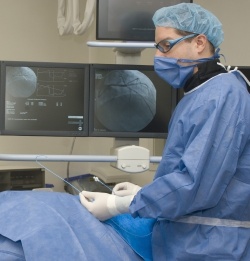Pioneering Therapies with Interventional Radiology
The days when radiologists were only involved in diagnosis are long over. Modern medicine requires interventional radiologists to use their specialist knowledge of image-guidance (X-ray, CT, MR) to perform procedures which are extraordinarily precise, and thus gentle on the patient. These methods can, in many cases, replace more invasive therapies and save on operation costs.

Minimally invasive solutions for prevalent conditions
The specialist knowledge of interventional radiologists allows them to offer a wide range of therapies, such as local, non-surgical treatment of cancerous tumours, which, in targeting the tumour directly, avoids the systemic effects of traditional chemotherapy. For patients with smoker’s leg or diabetic foot, timely revascularisation can prevent the need for amputation. Minimally invasive interventions on the spine and intervertebral discs can avoid the higher-risk alternatives. A full list of conditions that can be successfully treated by IR can be found at www.cirse.org/index.php?pid=83.
Reducing the burden for patient and payer
The Chairmen of this year’s European Congress of Interventional Radiology (C IRSE 2011) agree that IR has many benefits to offer: “IR interventions,” says Prof. Thomas Helmberger, “can offer the patient a much lower burden of pain, and can often facilitate a quicker recovery than the surgical alternatives.” His co-chairman, Prof. Josef Tacke, is keen to underline the cost-savings that IR can offer: “As well as the benefits to the patient, health boards and insurers can also benefit from the shorter convalescences and cost effective therapies.”
Munich – host to Europe’s interventionists
From September 10-14, Munich will play host to CIRSE 2011. Over 6,500 radiologists from all over the world are expected to attend lectures on and discussions of the revolutionary therapies that IR is offering, sharing their latest findings. In Germany, where interventional radiology is a compulsory component of radiologist training, IR treatments are offered on a wide basis, and help treat patients in whom the significantly more drastic conventional methods have failed.
Picture Legend: ©Reflekta. Interventional radiology is minimally invasive due to advanced image-guidance.
13.07.2011





